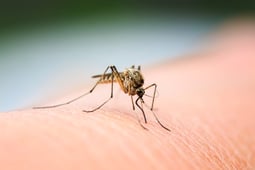According to the CDC, West Nile Virus is the leading cause of mosquito-borne illness in the continental United States. So far in 2023, WNV has been found in mosquitoes in 11 Massachusetts cities and towns. There are no vaccines to prevent or medications to treat WNV in people, but you can reduce your risk by taking precautions to prevent mosquito bites. Here's what you should know about West Nile Virus.
What is West Nile Virus?
West Nile Virus is transmitted to a mosquito when it feeds on an infected bird. The virus is then passed to humans through the bite of the infected mosquito. WNV is very rarely spread from person to person.
Symptoms of West Nile Virus
Many people infected with WNV do not experience any symptoms; however, some may report:
- Fever
- Headache
- Fatigue
- Body aches and/or joint pain
- Vomiting and/or diarrhea
- Rash
Severe illness can develop in some people, such as encephalitis or meningitis.
Treatment for West Nile Virus
There is no vaccine or specific medication for WNV; those who experience symptoms may find relief in rest, fluids, and over-the-counter medications. Severe cases may require hospitalization.
 How to Prevent Mosquito Bites
How to Prevent Mosquito Bites
To reduce your risk of contracting West Nile Virus, mosquito bite prevention is key:
- Use EPA-approved repellents
- Wear long sleeves and pants when possible
- Avoid outdoor activities during dawn and dusk, peak times of mosquito activity
- Ensure that windows and doors close securely and screens are intact
- Reduce standing water around your property, such as wading pools, pet dishes, bird baths, buckets, wheelbarrows, tire swings, leaky outdoor plumbing, and clogged gutters
For even more protection from mosquito bites in your yard, call the experts at Burgess Pest! The best Massachusetts mosquito control starts with a free estimate today - with plans starting at just $49/month, why wait?



